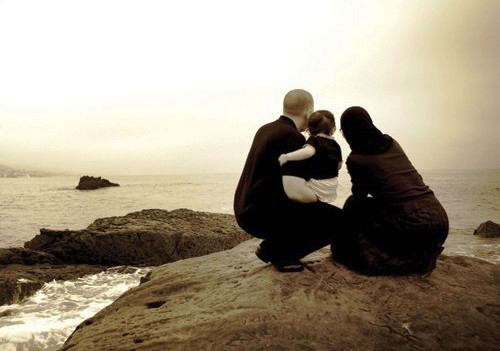 “My parents won’t let me marry who I want”
“My parents won’t let me marry who I want”
by: Imam Khalid Latif
A young woman once approached me after a lecture I gave at a conference asking if we could speak in private. We found a room to sit in and she proceeded to tell me about a young man who she wanted to get married to. He made her feel like a better person, gave her a renewed sense of conviction to her faith and towards God, and overall just made her happy. It made perfect sense to her that they should get married. Her mother didn’t think so though.
Every time the conversation was brought up, the mother would harshly disagree with her daughter, saying things like “I wish you were never born” and “If you get married to him I will do something to myself. I’ll kill myself.” She preferred that her daughter marry someone from their own culture and not outside of it.
After many months of many arguments, this young woman stood emotionally debilitated at a crossroads and like so many others that I have met with this issue had one question on her mind: What should I do?
Also Read: Imaam Yakhsyallah: Nurture Love for the Prophet, One Will Be with Whom One Loves
Ibn ‘Umar, may God be pleased with him, said, “God has called them the ‘dutiful’ (al-Abrar) because they are dutiful to their parents and children. Just as you have a duty which you owe your parent, so you have a duty which you owe your child.”
Many Muslims find themselves in similar situations. This week alone, I’ve seen five people who are dealing with this issue. They hope for a celebratory conversation with family, but instead are met with harsh disagreement and unrelenting anger, which is very different from simply disagreeing. The latter can at least be understood. The former bears unrealized consequences and definitely takes its toll.
When this young woman asked me what she should do, I responded saying I couldn’t tell her that. I didn’t know anything about her, her family, or the man she was interested in. It would be irresponsible of me to tell her in a black and white way, do this or don’t do that. I didn’t know her.
What I did tell her was that she seemed tired. I could almost guarantee that she was not eating or sleeping properly and that this decision was something that was preoccupying her thoughts every day. I asked her what she was doing to cope with it and recommended she take some time to regain some strength physically, spiritually and in turn emotionally so that she could be ready to make her decision in either direction with confidence. Right now if she made a choice, it would simply be to no longer feel the emotional anxiety and pain she was feeling and not necessarily with a mindset of what made the most sense in the long-term. Even if she landed on the same choice she would have made if it was done with confidence, her process behind it being rooted in feelings of disarray would lead to potential issues of regret and doubt down the line. The worst time to make a decision is when your emotions are in control of you rather than you being in control of your emotions.
Also Read: Thanksgiving: An Islamic Perspective
At the point then when she has re-centered herself, even if slightly, the decision she would make shouldn’t be framed in “right” and “wrong,” which then somehow would get elevated to “halal” and “haraam,” because that in itself can be paralyzing. Some decisions aren’t right or wrong decisions, but are simply just decisions which will take you down a path that will yield more opportunities to make choices and decisions. And we just have to deal with what comes of them.
If you find yourself in such a situation, a few things to remember:
- Find someone to talk things out with that makes sense. A lot of times we turn to individuals who might have our best interest in mind, but aren’t really the best resources. This person should not be jumping to tell you what to do (barring emergency situations) but rather should be someone who objectively helps facilitate a process for you to make a decision. Sometimes that can’t be a best friend who is too emotionally tied to you, or a religious scholar at a conference or on youtube who has no idea who you are. But someone who makes sense to speak with.
- Don’t make decisions at emotional times. As hard as it is, the worst time to make a choice is after you’ve gone through an argument or, on the other hand, a really love-filled experience that makes you just as delusional to reality. Let yourself be as centered as possible so that you are fully present emotionally, spiritually, mentally and physically in the choice you are making.
- Find outlets that make sense for you. Preemptively, you want to learn how to deal and manage stressful situation in healthy ways. Figuring out coping mechanisms that make sense for you subjectively are important so that you know of ways to relieve tension and stress and can be in a state that relaxes you enough to be confident in the choices you make in life. These outlets shouldn’t be harmful or intoxicating — look to things like exercise, reading, prayers, socializing, cooking, or writing. As long as it’s not hurting you, whatever you come up with just needs to make sense for you.
- Make the istikhara prayer, but learn actually how it works. Built into our tradition is a prayer the purpose of which is to help us make decisions through turning to God. The number of people who I have seen who try it and don’t really know how it works is quite large. Here is where you should go to someone trained in the religious sciences and ask them to explain it to you abstractly so you know how to use it and also don’t let it be something that is used against you. I’ve seen a lot of people whose families adamantly disagree with them and then the next day tell their kids, “By the way, I prayed istikhara and the results said you should listen to me.” A lack of knowledge will not be helpful at that time.
- Don’t lose hope. Let yourself be open to things going in either direction, and seek to find contentment with whichever way things end up going. If something doesn’t work out the way you had hoped, keep moving forward. My students often come to see me when they fail an exam and are distressed, wondering what they should now do. I usually tell them they should study and be ready for the next one.
- If you are a parent, be smart in how you speak with your children. The discourse that exists in parent/child relationships is heavily favorable towards the parents. With that kind of authority comes responsibility. And as with any authority, it’s not right to abuse it. (T/P3/R01)Mi’raj Islamic News Agency (MINA)
Sources:
- 1. http://www.huffingtonpost.com/
- 2.http://muslimvillage.com/
Also Read: Achieving the Position of Fasting Expert with Kindness of Morality






























 Mina Indonesia
Mina Indonesia Mina Arabic
Mina Arabic